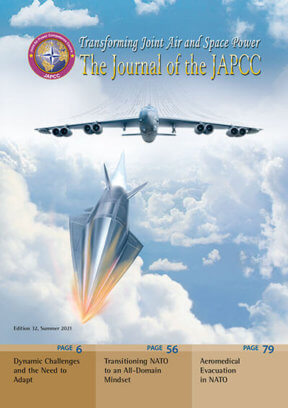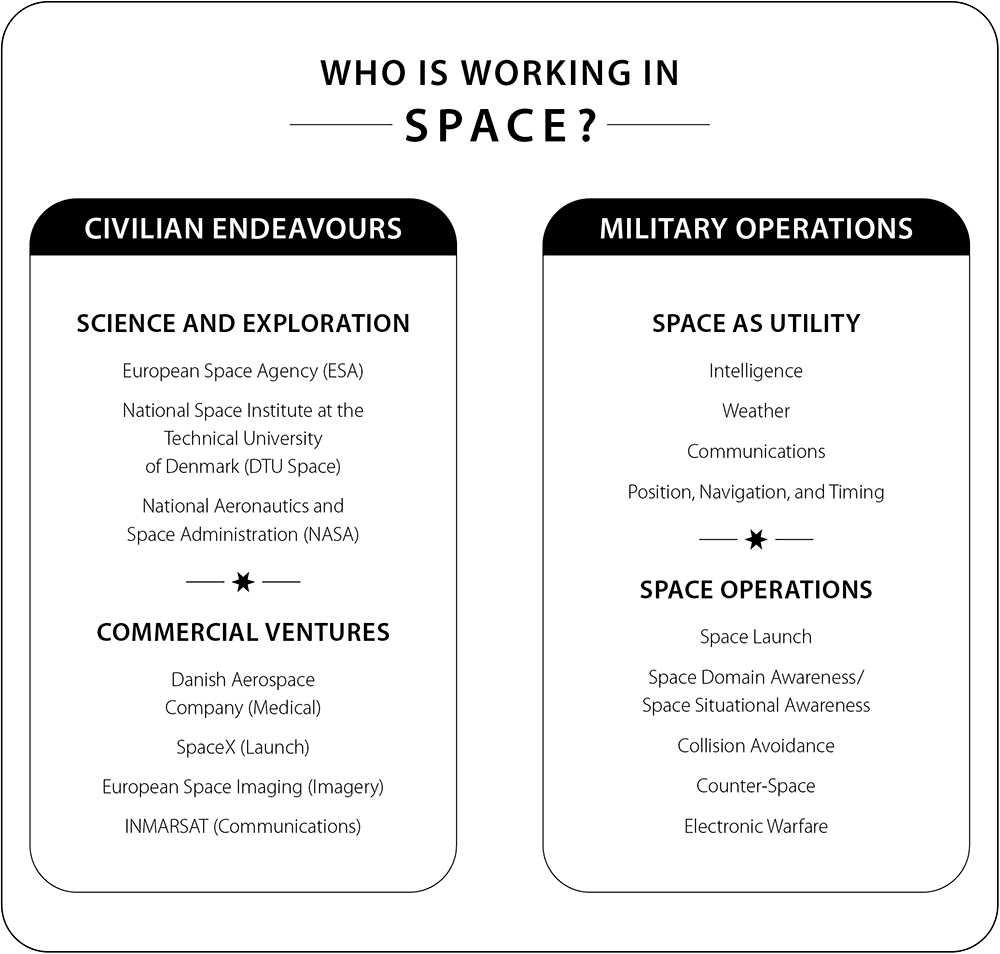‘Where you stand depends on where you sit.’1
Rufus Edward Miles Jr.
Introduction
‘We have declared space an operational domain for NATO, recognising its importance in keeping us safe and tackling security challenges, while upholding international law,’2 announced the North Atlantic Council, from London, on 4 December 2019. This recognition has been widely celebrated across the NATO Command and Force Structures and initiated numerous activities. However, generic use of the term Space has caused a great deal of disparate concepts, themes, and pursuits to be melded together even when they have little to nothing in common with one another.
The first of four groups this paper identifies are those focused on exploration and scientific pursuits. While there have been military members to travel into Space, the missions have been focused on continuing humanity’s understanding of the planet, solar system, and universe. The second group is comprised of commercial companies seeking to earn a profit by providing various Space-related services such as communications, imagery, and Space launch. The next group are the military members and capabilities utilizing Space-based Data, Products, and Services (DPS) as a utility function in the execution of military operations within the earth’s atmosphere. The Position, Navigation, and Timing (PNT) provided by the Global Positioning System (GPS) is a prime example of this utility function. Modern militaries, including NATO, are dependent upon Space-based PNT but are uneducated and unconcerned about the operational mechanics involved with ensuring the service. The final group are the military Space operators, those focused on operating in Space. For NATO, and many of its members nations, this last group is the smallest and yet potentially the most impacted of the groups listed by NATO’s recognition of Space as an Operational Domain.
The enthusiasm felt across the communities of interest listed, with regards to the recognition of Space as a NATO Operational Domain, does not mean all those communities are considering Space from the same perspective or with the same goals in mind. This article will discuss the various tribes and expand on the challenges facing NATO as it seeks to develop its recognition of Space as an Operational Domain amidst various interests. The goal being to allow for discussion regarding a way ahead for Space within NATO, informed (at least partially) as to the different perspectives and ambitions.
Civilian Exploration and Scientific Pursuits
Two of the more prominent Space-related exploration and scientific organizations currently in existence are the United States’ (US) National Aeronautics and Space Administration (NASA) and the European Space Agency (ESA). NASA’s Vision is ‘to discover and expand knowledge for the benefit of humanity,’3 while ESA’s mission is to ‘to shape the development of Europe’s space capability and ensure that investment in space continues to deliver benefits to the citizens of Europe and the world’.4 Both of these organizations, and others like them, primarily seek to explore and learn. They also exist to promote commercial interests within the US and Europe, respectively, which will provide benefits for their populations from Space-related endeavours.
Organizations focused on exploration and scientific pursuits share some interests with the other groups discussed in this paper, such as advancements in technological capabilities5, environmental impacts on Space vehicles6, and congestion of various orbits by operational satellites and debris7. However, their interest in these areas is foremost in support to their goal of scientific advancement and exploration.
Civilian Commercial Interests
While initial forays into Space were steps of governments, commercial interests in Space-related activities have recently grown from supporting national aspirations to fully independent commercial interests. Indeed, ‘the investment implications for a more accessible, less expensive reach into outer space could be significant, with potential opportunities in fields such as satellite broadband, high-speed product delivery and perhaps even human space travel’.8 This means that in the ‘near term, space as an investment theme is also likely to impact a number of industries beyond Aerospace & Defense, such as IT Hardware and Telecom sectors. Morgan Stanley estimates that the global space industry could generate revenue of more than $1 trillion or more in 2040, up from $350 billion’9 in 2020. Additionally, the prospect of mining celestial bodies (such as asteroids) is on the cusp of becoming a reality. NASA is planning to launch a spacecraft in mid-2022 at an asteroid identified as ‘16 Psyche’, which has the possibility of ‘being worth $10,000 quadrillion if mined,’10 and amount more than 75,000 times that of the world economy.
While it may be some years before asteroids are successfully mined for commercial benefit, the trend clearly shows substantial growth in commercial Space enterprises with more to come. As with those focused on exploration and scientific pursuits, commercial interests share certain concerns about operating in Space. Those concerns are in relation to a bottom-line that separates success and failure based on financial considerations.
Military Utility Users
For NATO, ‘Space is essential to the Alliance’s deterrence and defence. Space underpins NATO’s ability to navigate and track forces, to have robust communications, to detect missile launches and to ensure effective command and control.’11 Furthermore, ‘Understanding and leveraging the Space domain is critical to NATO military planners and operators’12 because ‘the absence of Space products and services will inhibit the ability of NATO to achieve overall objectives in the most efficient and effective means possible’.13 As long as NATO does not own or operate any Space-based capabilities it is dependent upon Space-based services provided by the member nations in the form of Space-derived DPS. The new focal point within NATO for the coordination and dissemination of DPS will be the NATO Space Centre14, located at Ramstein Air Base in Germany.
What is important to understand is that NATO utilizes Space capability-derived DPS to support terrestrial operations. In this sense, Space (the Operational Domain) serves as a utility function, supporting the collection and/or dissemination of DPS to support NATO operations not taking place in Space. The various NATO headquarters, staffs, and operators are only marginally concerned with Space, rather their focus is on ensuring continued access to the DPS which enables their operations within earth’s atmosphere. Therefore, the focus in NATO regarding Space has been Space Support in Operations15, versus Space Operations themselves.
Military Space Operators
The final group this paper will discuss is both the smallest group and yet the group most impacted by NATO’s recognition of Space as an Operational Domain. The military members serving in NATO with education, training, and experience with Space Operations currently number around two dozen, spread across the NATO Command Structure (NCS) in ones and twos. They collaborate under the NATO Bi-Strategic Command Space Working Group (NBiSCSWG), which is co-chaired by two Lieutenant Colonels, one each, from Allied Command Operations and Allied Command Transformation. The NBiSCSWG is tasked ‘to increase Collaborative Space Support in NATO operations by studying operational requirements and improving Space education and training’.16
This small group of dedicated Space professionals strives to provide to support to NATO operations, education, training, and development of policy and doctrine. Their numbers will soon be bolstered by an influx of staff members into the previously mentioned Space Centre, but it remains to be seen if those staff members will bring Space expertise to NATO or instead come searching for experience to take back to their home nations. The establishment of the Space Centre is a significant undertaking and achievement for NATO, which may be more challenging if it must include extensive education and training for its staff to achieve a basic understanding of Space-related operational considerations.
What will be needed within the NCS, aside from the Space Centre, will be an increased cadre of Space experts to bolster the integration of Space Support in NATO Operations. This integration will require including Space-related education into existing curricula, increased emphasis on Space DPS within NATO training exercises, and further development of policy and doctrine. An important first step may be the development of a NATO Space Policy which can be shared and understood across NATO, as the current Overarching Space Policy (adopted in June 201917) is restricted, and/or the creation of NATO Security Classification Guide for Space so people can know what they can and cannot speak and write about regarding NATO’s approach to Space.
Additional leadership, from officers who are educated and experienced Space professionals, is also needed at the various NATO Headquarters. General Officers and Colonels, with years of Space expertise, will have greater access to key senior-level decision-making discussions which will allow them to better promote the growth and understanding of Space within NATO. The senior officers can also provide the appropriate strategic guidance and direction to the staff officers and non-commissioned officers focused on Space-related deliverables within the various headquarters’ staffs.
Conclusion
While Space and Space-based capabilities are increasingly utilized by more people and interests, it is important to be able to distinguish the different perspectives and aspirations as NATO collectively integrates Space-related activities and capabilities into daily life and military operations. While there are significant overlaps and shared interests, NATO cannot allow these overlaps to confuse and distract discussions from focusing on the further development of ideas which allow for the exploitation of Space-based, and -related, capabilities for the benefit of the NATO Alliance.
General Jeffrey L. Harrigian, JAPCC Director and Commander, Allied Air Command, recently stated, ‘coordination with Nations in the space domain is a critical mission as civilian, military, and commercial organizations become increasingly dependent on space capabilities for our safety and security.’18 That coordination must be informed, not just by an understanding of the existing and emerging technologies and the various operational considerations, but also by the mental framework in which NATO personnel are each working. It is an understatement to say that Space is big. NATO must also recognize that collectively it is piling a great deal of meaning and perspectives into the word Space, and needs to ensure personnel do not speak past one another while utilizing the same terms with vastly different meanings, goals, and context.













